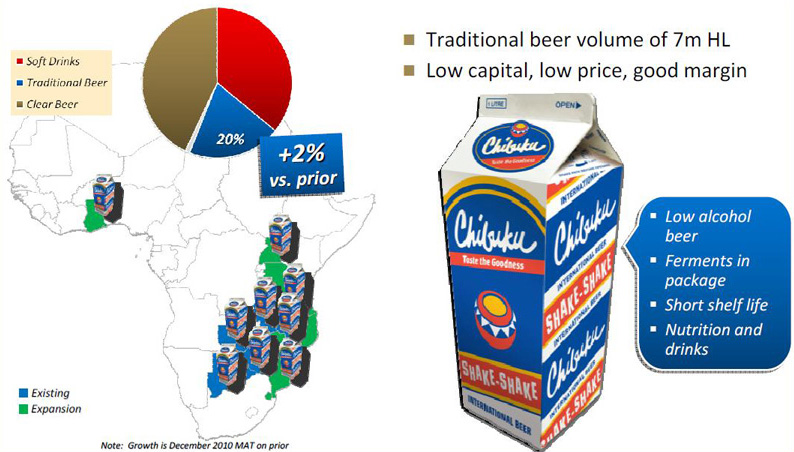SABMiller to roll out Chibuku across more markets
Given that volumes of homemade spirits and brews are estimated four times the volumes of commercial beer in Africa, it’s only logical that SABMiller is trying to woo beer drinkers across the continent to trade up to commercially-produced alcohol, i.e. their beers. The cheapest commercially brewed beers in Africa are sorghum beers and with Chibuku SABMiller think they have got a winner.
Chibuku, sold in blue-and-white cartons, is called “Shake-Shake” by consumers because the ingredients tend to separate. SABMiller, better-known for clear beers including Peroni and Grolsch, is counting on Chibuku to win an additional segment of the market: lower-income Africans more used to “informal” beers, or homebrews. SABMiller plans to sell the drink in 12 countries within three years. SABMiller estimated in 2009 that the market for African homebrew could be worth USD 3 billion.
The beer started in Zimbabwe in the 1950s and is well-established in Malawi, Botswana and Zambia. Chibuku is drunk in various ways – from cutting off the top of the carton in Malawi and sharing it with friends, to drinking it from cups in Zambia – and varies in flavours.
But make no mistake, Chibuku’s main selling point is price. Chibuku costs about USD 0.58 per one-litre carton, while bars will charge punters about USD 0.80 upwards for a bottle of a cheap "clear" beer.
The trouble with Chibuku is that the drink has a shelf life of about five days during which it ferments further, becoming more alcoholic and more sour. Delivering a beer with a five-day life span to customers is a challenge, especially in rural areas where there are no paved roads, limiting the number of people SABMiller can sell it to.
Apparently, no longer. Because there is Chibuku Super. The product is being tested in Zambia, and it has two notable differences – it’s sold in leak-proof plastic cartons and has a shelf life of 21 days, Bloomberg reported on 8 March 2012. That would allow selling Chibuku in bars and in shops.
This year, the world’s number two brewer said they will be spending USD 260 million across the continent, partly to expand Chibuku’s production. Last November, SABMiller announced they would expand the capacity of their subsidiaries in Uganda, Ghana, Zambia and Tanzania. SABMiller will also commission a doubling of its South Sudanese capacity this year.
SABMiller boosted first-half revenues (to the end of September 2011) from African countries, excluding South Africa, by 22 percent to USD 1.8 billion, the London-based brewer said on 17 November 2011. SABMiller splits out South African sales from the rest of the continent. Africa, excluding South Africa, contributed 12 percent to SABMiller’s EBITA.
SABMiller raised its mid-term revenue and profit growth targets last year for the region, seeking 3 percent to 5 percent annual sales growth and higher margins over the next three years.
Chibuku is an international beer – in Africa at least
Authors
Ina Verstl
Source
BRAUWELT International 2012

